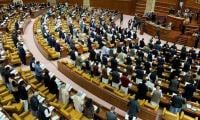VIENNA: Austria narrowly avoided becoming the first EU country to elect a far-right candidate as head of state, as postal ballots decided a knife-edge presidential run-off vote in favour of his environmentalist rival.
After an election that had been too close to call on Sunday, a count of the absentee votes on Monday thrust the 72-year-old Alexander van der Bellen past anti-immigration Freedom Party rival Norbert Hofer and into the largely ceremonial post of president.
The Freedom Party and its resurgent European allies expressed disappointment at the defeat but delight at the surge in support for them from Austrian voters, while traditional parties of government breathed a sigh of relief.
“Fifty percent confidence in Norbert Hofer is a gigantic showing,” Hofer’s campaign manager Herbert Kickl told public broadcaster ORF, toning down comments before the election that suggested the Freedom Party (FPO) might contest the count.
“One thing is clear: there are many Norbert Hofers in the Freedom Party and we are very, very well placed for parliamentary elections - whenever they come,” he added.
“This is just the beginning,” FPO boss Heinz-Christian Strache said on his Facebook page.
One factor behind the strong FPO showing was dissatisfaction with the feuding ruling coalition of two centrist parties. Opinion polls regularly suggest the Freedom Party would win parliamentary elections if held now.
The current government’s term runs until 2018.The Interior Ministry count gave van der Bellen 50.3 percent of the vote, compared to 49.7 percent for Hofer, who had run on an anti-immigration platform.
The margin of victory was just over 31,000 out of nearly 4.5 million valid votes cast.
Hofer conceded defeat in a post on his Facebook page, thanking his supporters and telling them not to be despondent.
“Of course I am sad today,” he said.
“I would have liked to take care of our wonderful country for you as president.”
Hofer’s defeat averts a big potential embarrassment for Europe’s political establishment, increasingly under threat from populist parties that have profited from concerns about the refugee crisis, weak growth and high unemployment.
Trump, 77, is charged with 34 counts of falsifying business records
Garcetti said a criminal case and indictment had been brought “and if there is any connection to state actors in...
Tehran has always said it had no plans to obtain nuclear weapons
“Both sides have been working together to ensure continued operation of Indian aviation platforms,” India’s...
“China is one of the pillars of the new world order,” Orban said
“We are putting maximum pressure on our partners to increase weapon deliveries,” Zelensky said







